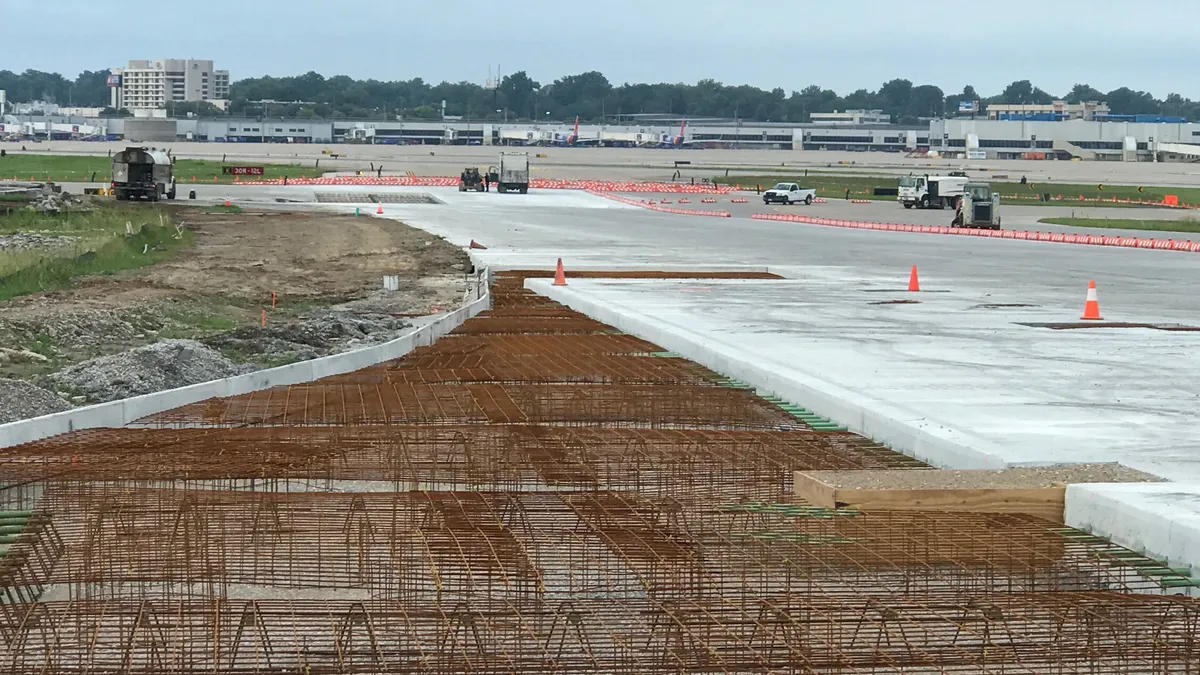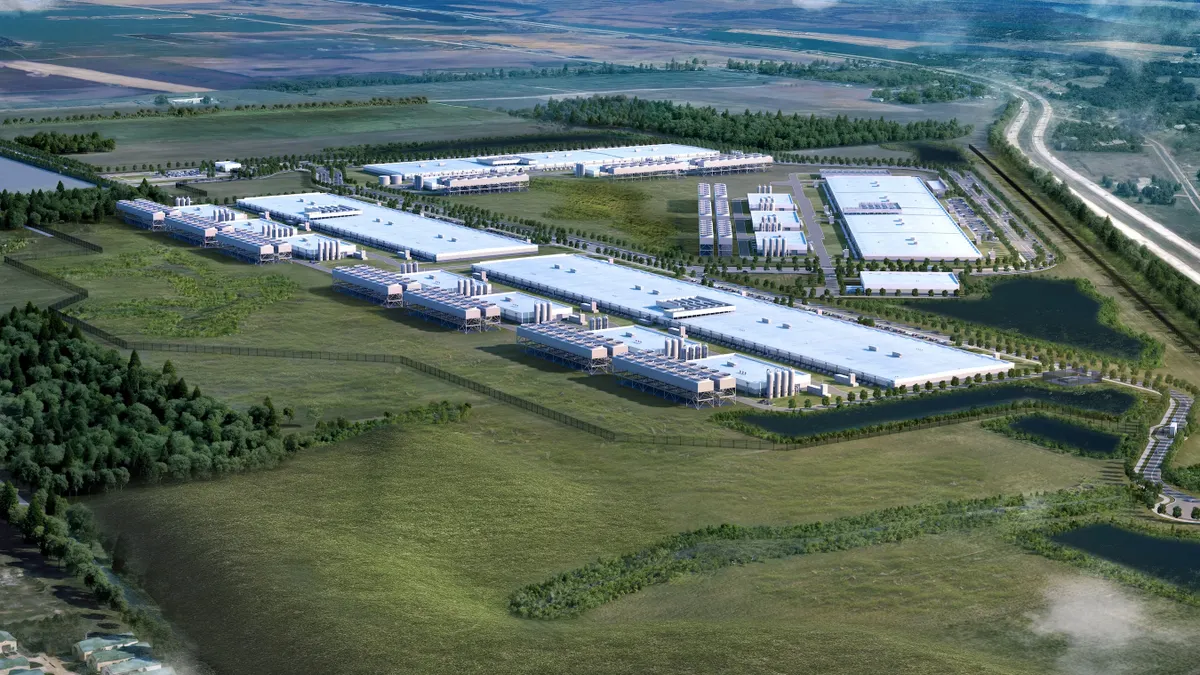In December, the St. Louis American named Kwame Building Group CEO Anthony "Tony" Thompson as its Person of the Year for 2021. Through this honor — which overlaps Kwame Building Group's 30th anniversary — the paper highlights not only his career and the success of his company, but his commitments to his community, equality in education and diversity and inclusion within his firm.
Based in St. Louis with offices in Atlanta, Dallas and Seattle, Kwame Building Group is exclusively focused on construction management services, including estimating, scheduling, project planning and value engineering, among others. It has completed over 6,000 projects and currently manages more than $300 million in work each year, with 75% of its work from repeat clients, including a 26-year business relationship with St. Louis Lambert International Airport (above).
In conjunction with the firm's 30th anniversary, Construction Dive sat down with Tony Thompson to learn more about the history of his company, the ins and outs of construction management and his experiences as the leader of a minority-owned business enterprise.
This interview has been edited for brevity and clarity.
CONSTRUCTION DIVE: How did your experiences lead you to found Kwame Building Group?
TONY THOMPSON: I graduated from University of Kansas in architectural engineering. I always wanted to have my own business, I just didn't know if I wanted to be on the design side or if I wanted to be on the construction side.
I knew that most small businesses fail because of their lack of business knowledge, not because they weren't technically prepared for business. So I went back to get my MBA and learn about business before I decided to take that leap. I transferred from the Army Corps of Engineers over to Monsanto, I did a little design work, but I was also a mechanical engineer handling and managing design and construction projects. That was when I started getting a real taste of the project management side of things.
Then I transferred from that to Anheuser Busch, where I was responsible for developing the budgets, hiring architects to manage the design and overseeing and managing the construction on 11 out of the 13 breweries. And I thought, I can do this for them, I can do this for myself. So I developed a business plan while I was working on my MBA, and I actually ended up writing the plan as part of a project in the MBA program.
I was doing a couple of small projects [on the side], like renovating little playgrounds for the YWCA, and on the weekend I would put together the executive reports, the summary, the estimates, the budgets, the schedules. Kwame is a Ghanian name, meaning born on Saturday, and the company was born on Saturday.
How did you develop the construction management niche you operate in today?
My experience has always been that of the owner's representative, so I started the company as a construction manager in the sense of a construction management firm as the agent of the owner.
Within the construction management arena, there are two distinct disciplines. One is a construction manager as an agency, that's the agent or owner's representative. And then there's a construction manager at risk, where they also handle the construction. So a lot of contractors jumped in this arena, and they call themselves construction managers and people use it interchangeably. But those are two distinct delivery systems.
A lot of people don't know the difference, and there have been times when the owner has asked us to hold the construction contract. As a construction manager acting as the agent, I'm representing the owner, but the owner holds the contract of the construction trade.
It's a very, very different philosophy and approach, acting as agent versus acting as the contractor. Most contractors are motivated by profit and change orders and that kind of thing. My job is to represent the owner and prevent change or mitigate change orders and increases to the budget.
What are some of the biggest challenges you've encountered, whether recently or over the past 30 years, and how did you overcome them?
There have been numerous as you can imagine, but there are ones that kind of stick out.
One, I tell people, we're a big company in a little company's body. What I mean by that is, we handle big projects and high-profile projects, things of that nature. But at the end of the day, we're still a small business. I'm not trying to pretend to be something that I'm not. But as a professional service organization, I don't have to have a billion dollar revenue or 10,000 employees to manage a project. We're selling brain power, we're selling our engineering expertise and experience in managing the process.
So having said that, the challenge that I've run into is sometimes overcoming that whole perception of being not big enough, or too big, believe it or not. Early on, people would assume that we weren't big enough. So we were relegated to being a sub or to fill the minority participation goal on the project.
And then our other problem was where once we did a couple of projects, our name got out there, we're in the paper, we win this job or that job. And then there's a church or a small not for profit renovation of a 2 or $3 million project and we don't get a call because they think we're too big, and that's not true.
The other challenge that I've had to overcome, which is the pink elephant in the middle of the room, is discrimination and racism. I'd be lying to you, and I'd be remiss to sit here and tell you everything has been great and wonderful and we haven't had any challenges where that's concerned. Because it wouldn't be true.
There have been plenty of times when... it's just one of those things. People think you're seeing ghosts. You know it's there, but you can't really put your finger on it. And it's hard to say, well, this is the reason. But there are certain things that have happened from time to time where there is no other reason. You just have to look at the various cases on a case by case basis. Don't get me wrong, everything is not racism. I've never been one of those people that think that or believe that. But I also am not one of those people who thinks that it doesn't exist.
How do you create a welcoming environment at your firm?
I think that this country is really still dealing with leveling the playing field and creating equal opportunities for everyone. I try to create an organization that allows opportunities for individuals, male and female, primarily minorities who probably wouldn't have gotten the opportunity otherwise. Whether I liked it or not, my mom raised us to believe none of us have made it until all of us have made it.
That's why I created a scholarship program in my foundation, where I've given out over $3 million in endowed scholarships to 15 or 16 of the local universities for first generation and minority students. I have tuition reimbursement for my employees. Now it's a shame sometimes. because I'm surprised how many people don't take me up on it. But at the same time, there are quite a few who have not only gotten their graduate degrees by working at Kwame, but their undergraduate and graduate degrees.
What do you think your biggest opportunities are for the future, and what are your goals for the company moving forward?
The infrastructure bill is going to be huge on so many levels. Not only for society as a whole, because we need it, but because some of our major projects and experiences have been at airports, on light rail Metro projects and some road-type projects. So I think the future for us is going to be as part of program management teams and opportunities for airport expansions.
And our experience on airports, and on light rail, will help us to position ourselves for work in other parts of the country. I think those are the biggest and clearest opportunities for a firm like mine. As you look out into the future, the public agencies, in particular, don't have the staff or the people [for construction management.] So when you throw a capital project on top of it, like a new terminal, or new rail line or a new system, they need help. That's where we come in.




















